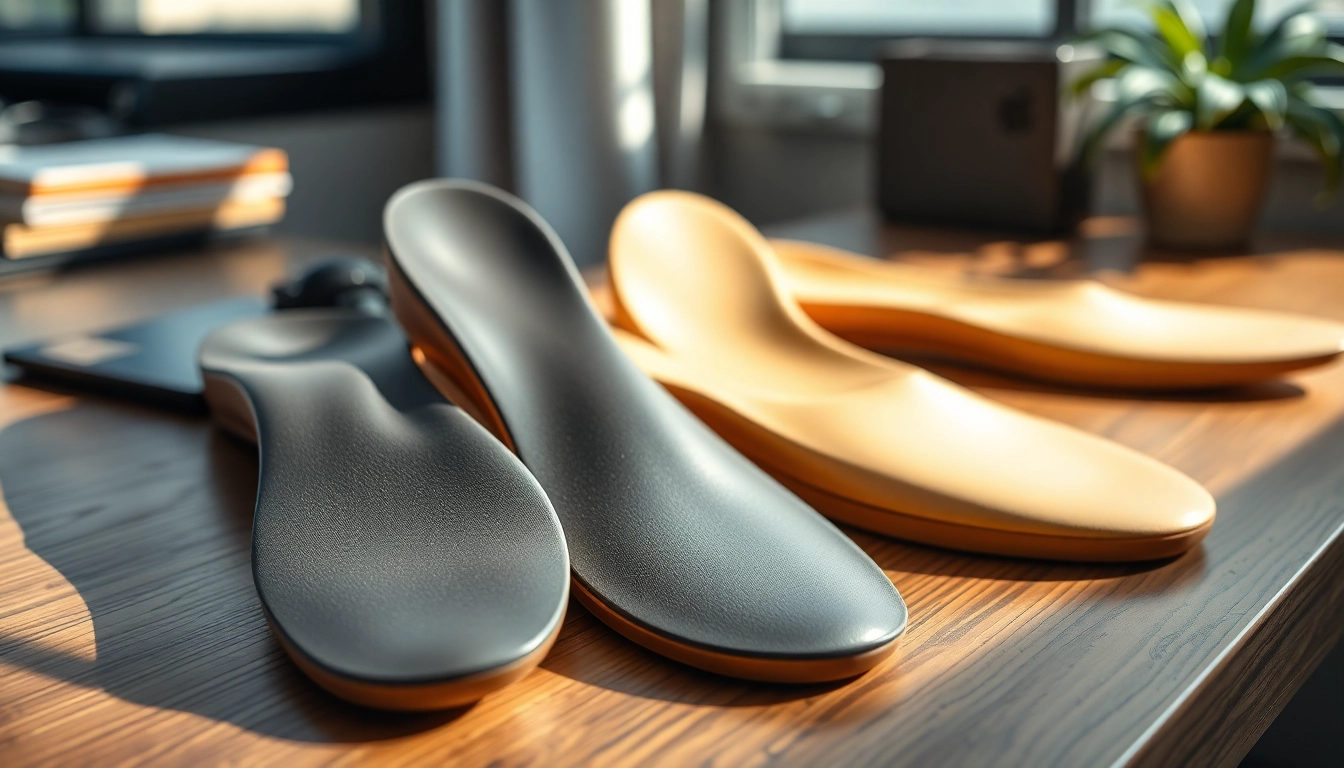
Understanding Custom Orthotics
What Are Custom Orthotics?
Custom orthotics are specially designed devices that provide support to the feet, improving comfort and maintaining proper alignment for a myriad of physical activities. Unlike standard shoe inserts that are mass-produced, custom orthotics are tailored specifically to the unique contours and requirements of an individual’s feet. They are typically manufactured based on a detailed assessment of a person’s foot structure and their specific needs, including any existing medical conditions that could affect foot health. This personalization is crucial as it allows orthotics to effectively address specific foot problems, thus enhancing overall mobility.
Benefits of Using Custom Orthotics
The advantages of using custom orthotics extend far beyond mere comfort. Some of the key benefits include:
- Pain Relief: Many users report significant reductions in pain associated with conditions such as plantar fasciitis, arthritis, and flat feet.
- Improved Posture: Proper support from orthotics helps in maintaining better posture, which can reduce strain on the back and improve overall body alignment.
- Enhanced Performance: Athletes and active individuals can experience improved performance due to reduced fatigue and better stability during activities.
- Injury Prevention: By correcting biomechanical issues, custom orthotics can help prevent injuries caused by misalignment or excessive strain on certain areas of the feet.
How Are Custom Orthotics Made?
The process of creating custom orthotics involves several key steps:
- Initial Consultation: This typically involves a podiatrist or a specialized orthotic provider assessing the patient’s foot structure and gait.
- Foot Impressions: Techniques like 3D scanning or casting are used to capture the exact shape of the feet.
- Design: Using the gathered data, customized orthotics are designed to address the specific needs identified during the consultation.
- Material Selection: Orthotics can be made from various materials, ranging from softer foams for comfort to firmer materials for more rigid support.
- Manufacturing: The orthotic is crafted using advanced technology and techniques to ensure precision and quality.
The Importance of Proper Foot Support
Common Foot Problems Addressed by Custom Orthotics
Custom orthotics are designed to address a broad spectrum of foot-related issues, including:
- Flat Feet: A common condition where the foot lacks an arch, often leading to pain and discomfort.
- High Arches: Similarly, individuals with high arches can suffer from poor weight distribution and excessive pressure on the forefoot and heel.
- Plantar Fasciitis: Involves inflammation of the plantar fascia, leading to severe heel pain, especially upon waking.
- Metatarsalgia: This condition refers to pain and inflammation in the ball of the foot, often aggravated by improper footwear.
Choosing the Right Orthotic for Your Needs
Choosing the right orthotic is critical for achieving the desired benefits. Individuals should consider their specific foot structure, medical history, and daily activities. A consultation with a healthcare professional can help determine the best type of orthotic based on personal factors such as foot type, activity level, and any existing medical conditions.
Impact of Foot Support on Overall Health
Foot health is intrinsically linked to overall health. Incorrect foot support can lead to a cascade of problems affecting the knees, hips, and lower back. For instance, poor alignment can contribute to chronic pain and fatigue, impacting one’s quality of life. Proper support not only alleviates discomfort but also promotes better posture, stability, and mobility, essential for an active lifestyle.
Types of Custom Orthotics Available
Hard vs. Soft Orthotics
Custom orthotics are generally categorized into two main types: hard and soft.
- Hard Orthotics: These are made from rigid materials and are designed to provide maximum support. They are often prescribed for individuals with more severe foot conditions or deformities.
- Soft Orthotics: They are crafted from softer materials that offer cushioning and shock absorption. This type is preferable for those seeking comfort and relief from minor pain or fatigue.
Orthotics for Specific Activities
Depending on the intended activity, custom orthotics can vary greatly. Athletes, for instance, may require orthotics designed to provide support during high-impact activities, while those whose jobs require prolonged standing may benefit from designs that focus on reducing fatigue.
Some specialized types include:
- Running Orthotics: Tailored for runners, these orthotics often include additional cushioning and support, catering to the specific forces encountered during running.
- Occupational Orthotics: Designed for individuals who work on their feet for extended periods, these orthotics aim to alleviate fatigue and prevent discomfort.
Custom Orthotics for Children and Adults
Both children and adults can benefit from custom orthotics, though children’s needs can differ significantly due to their developing bodies. Pediatric orthotics often focus on correcting developmental issues such as flat feet or improper alignment, while adult orthotics usually address more chronic conditions stemming from years of wear and tear.
Cost and Insurance Coverage for Custom Orthotics
Average Costs of Custom Orthotics
The cost of custom orthotics can vary significantly based on the materials used, complexity of the design, and geographical location. Generally, the average cost ranges from $200 to $800. It’s essential to consider additional expenses, such as follow-up consultations and potential adjustments to ensure the best fit.
Insurance Considerations
Insurance coverage for custom orthotics can be complex. While some plans may cover part of the cost, others might not cover custom orthotics at all unless specified medical conditions warrant them. It is advisable for individuals to consult with their healthcare provider and insurance company to understand their coverage.
Alternatives to Custom Orthotics
For those unable to afford custom solutions, several alternatives might provide relief:
- Over-the-Counter Orthotics: Readily available in drugstores, these may not offer the same level of support but can be a cost-effective option for mild discomfort.
- Footwear Adjustments: Sometimes, addressing comfort can be as simple as selecting shoes designed with better arch support and cushioning.
Testimonials and Case Studies
Success Stories from Custom Orthotic Users
Many users have shared their positive experiences with custom orthotics. For instance, an avid runner who struggled with chronic plantar fasciitis found relief and improved performance after using custom orthotics tailored to their foot shape and running style. Users often report enhanced daily mobility and less pain, underscoring the significance of personalized support.
Long-Term Benefits of Custom Orthotics
The long-term advantages often outweigh the initial investment in custom orthotics. Regular use can lead to sustained improvements in foot health, decreased reliance on pain medications, and better overall physical performance. Moreover, many users express an enhanced sense of well-being and quality of life simply because they can remain active and comfortable throughout their day.
Conclusion: Is a Custom Orthotic Right for You?
Determining whether custom orthotics are the right solution requires individual analysis of specific foot needs and conditions. Consultations with professionals can help tailor a solution that enhances comfort, addresses existing problems, and improves overall foot health. With the myriad options available—and the numerous benefits—custom orthotics can serve as an invaluable investment in your health and well-being.





